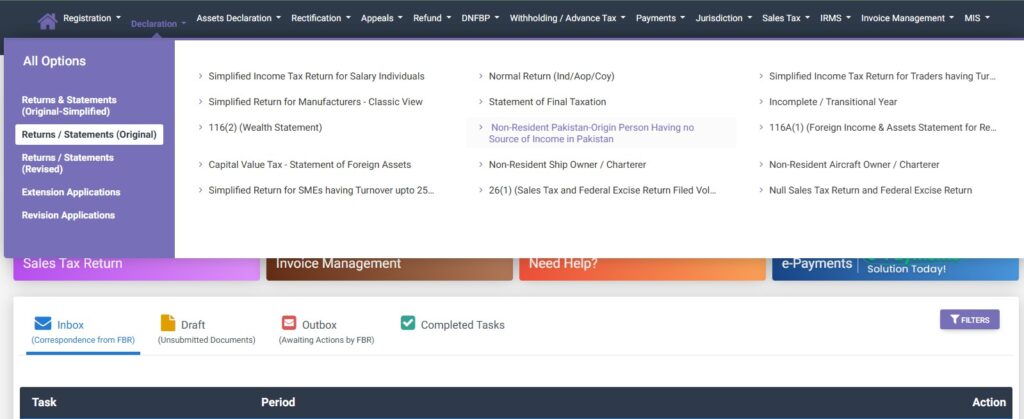For many Overseas Pakistanis, defined as individuals who live outside Pakistan for more than 183 days in a year, understanding how to file taxes in Pakistan can feel overwhelming, especially if you have no local income. This guide is designed for readers who have little or no knowledge of the tax system in Pakistan but want to become a filer (an active taxpayer) with the Federal Board of Revenue (FBR).
Becoming a filer, even with zero income in Pakistan, is straightforward: you can submit a NIL tax return, which essentially declares that you had no taxable income in the country for that year. Doing this not only fulfills your legal obligations but also gives you a range of financial and administrative benefits back home.
What Is a NIL Tax Return?
A NIL return is a tax filing submitted to the FBR when you have no taxable income in Pakistan during the financial year. This applies to Overseas Pakistanis who work or run businesses abroad and send remittances to Pakistan but don’t have local earnings. Filing NIL returns each year ensures that your name is included in the Active Taxpayer List (ATL), officially marking you as a filer.
Step 1: Register with FBR on IRIS
Before you can file any tax return, you must register with the FBR through its online tax portal, IRIS. Follow this detailed guide: How to Become a Filer as an Overseas Pakistani with FBR.
When you register, your CNIC or NICOP number will serve as your username, and the password will be emailed to you. You’ll also receive a PIN, which is required later to submit forms.
Step 2: Log In and Begin Filing a Tax Return as Overseas Pakistani
After registration:
-
Log in to IRIS FBR using your CNIC or NICOP number and the emailed password.
-
Click on the “Declaration” tab at the top of the screen.
-
Select the option “Non-Resident Pakistani Origin Person having no Source of income in Pakistan.”
The system will automatically attempt to redirect you to the NIL return form.
Step 3: Access the Form if Not Redirected
Sometimes the portal does not immediately load the form. If this happens:
-
Check the Drafts section on the main screen; your form should appear there.
-
If not, log out and log back in, or click the same option under Declarations again.
-
If the form is already in process, you’ll see an option to click and open it directly.
Step 4: Review the Pre-Filled Details
The NIL return form is generally pre-filled with your personal information. Since you have no taxable income in Pakistan, no additional income details are required.
This section will also display any assets or services already linked to your CNIC, such as:
-
Vehicles registered in your name
-
SIM cards linked to your identity
Step 5: (Optional) Declare Your Assets and Expenses
While not mandatory, it’s a good practice to declare your assets and wealth. This provides a transparent picture of your financial position, which is especially helpful if you plan to invest or make significant purchases in Pakistan in the future.
To do this:
-
Go to Wealth Statement > Personal Assets and Liabilities.
-
Add information about assets like property, cash, jewelry, or investments.
-
Include any expenses incurred in Pakistan, such as utility bills or education costs.
Step 6: Submit the NIL Return
Once everything is accurate:
-
Click the Submit button at the top of the screen.
-
Enter the PIN sent to your email when you first registered with FBR.
-
Submit your NIL tax return.
You can confirm successful submission by checking the Completed Tasks section under Declarations. It may take some time for the update to appear.
Benefits of Filing a NIL Return
Many Overseas Pakistanis wonder why they should bother filing NIL returns if they don’t owe taxes in Pakistan. Here are some compelling reasons:
-
Lower Tax Rates on Transactions
Filers pay significantly less tax on property purchases, vehicle registration, and banking transactions compared to non-filers. -
Inclusion in the Active Taxpayer List (ATL)
This official list confirms your compliance with tax laws and helps avoid penalties, travel restrictions, and other bureaucratic hurdles. -
Ease of Doing Business or Investing
Whether you want to buy property, open a business, or invest in Pakistan, being a filer streamlines these processes. -
Credibility with Financial Institutions
Banks, lenders, and government agencies view you as a compliant citizen, which enhances your access to loans and services. -
Future-Proofing Your Finances
Filing NIL returns creates a transparent paper trail that can protect you from unnecessary scrutiny when you eventually move assets or return to Pakistan.
Final Thoughts
Filing a NIL tax return as Overseas Pakistani is not as complicated as it may seem. By registering on IRIS, completing a simple form, and optionally declaring your assets, you can maintain your status as a filer, even while living and working abroad.
For non-resident Pakistanis, this small annual task can lead to long-term advantages, including lower taxes, smoother transactions, and greater financial credibility. In a country where compliance is increasingly valued, being on the right side of tax regulations is not just a duty, it’s an investment in your future.














